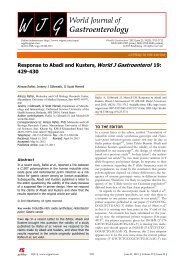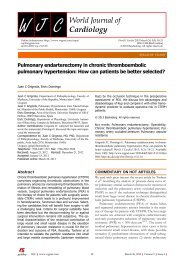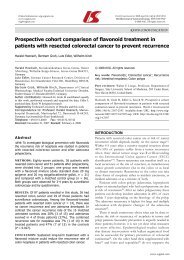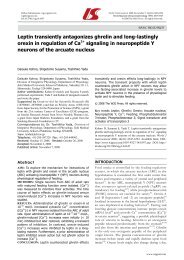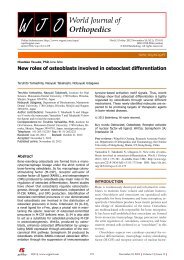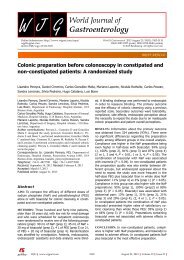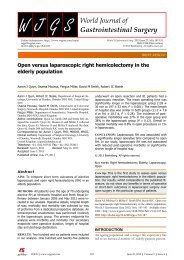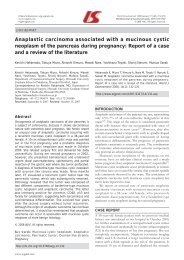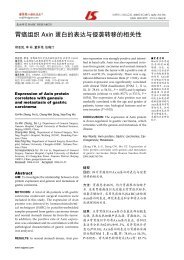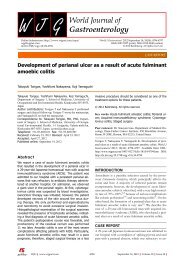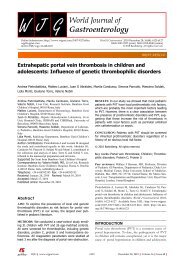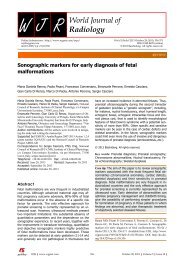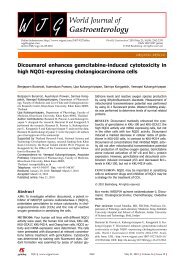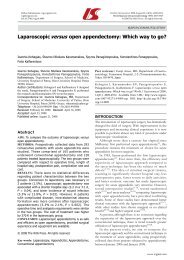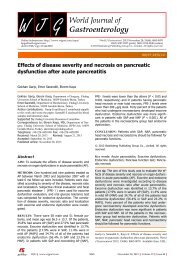Connective tissue growth factor reacts as an IL - World Journal of ...
Connective tissue growth factor reacts as an IL - World Journal of ...
Connective tissue growth factor reacts as an IL - World Journal of ...
Create successful ePaper yourself
Turn your PDF publications into a flip-book with our unique Google optimized e-Paper software.
Online Submissions: http://www.wjgnet.com/1007-9327<strong>of</strong>fice<br />
wjg@wjgnet.com<br />
doi:10.3748/wjg.v17.i2.267<br />
Splenic infarction <strong>as</strong>sociated with sorafenib use in a<br />
hepatocellular carcinoma patient<br />
S<strong>an</strong>g Ock Kim, S<strong>an</strong>g Young H<strong>an</strong>, Y<strong>an</strong>g Hyun Baek, Sung Wook Lee, Ji Sun H<strong>an</strong>, Byung Geun Kim, Jin H<strong>an</strong> Cho,<br />
Kyung Jin Nam<br />
S<strong>an</strong>g Ock Kim, S<strong>an</strong>g Young H<strong>an</strong>, Y<strong>an</strong>g Hyun Baek, Sung<br />
Wook Lee, Ji Sun H<strong>an</strong>, Byung Geun Kim, Department <strong>of</strong><br />
G<strong>as</strong>troenterology <strong>an</strong>d Hepatology, Dong-A University Hospital,<br />
Dongdaesin-dong, Seo-gu, Bus<strong>an</strong> 602-103, South Korea<br />
S<strong>an</strong>g Young H<strong>an</strong>, Liver Center, Dong-A University College<br />
<strong>of</strong> Medicine, 3-ga, Dongdaesing-dong, Seo-gu, Bus<strong>an</strong> 602-103,<br />
South Korea<br />
Jin H<strong>an</strong> Cho, Kyung Jin Nam, Department <strong>of</strong> Radiology, Dong-A<br />
University Hospital, Dongdaesin-dong, Seo-gu, Bus<strong>an</strong> 602-103,<br />
South Korea<br />
Author contributions: Kim SO <strong>an</strong>d H<strong>an</strong> SY contributed equally<br />
to this work; Kim SO, H<strong>an</strong> SY, Baek YH <strong>an</strong>d Lee SW contributed<br />
to drafting the report; Cho JH <strong>an</strong>d Nam KJ interpreted CT<br />
images; Kim SO, H<strong>an</strong> SY <strong>an</strong>d H<strong>an</strong> JS wrote <strong>an</strong>d revised the paper;<br />
all authors contributed to <strong>an</strong>alyzing the patient’s data.<br />
Supported by Dong-A University fund<br />
Correspondence to: S<strong>an</strong>g Young H<strong>an</strong>, MD, PhD, Pr<strong>of</strong>essor,<br />
Liver Center, Dong-A University College <strong>of</strong> Medicine, 3-ga,<br />
Dongdaesing-dong, Seo-gu, Bus<strong>an</strong> 602-103,<br />
South Korea. syh<strong>an</strong>@dau.ac.kr<br />
Telephone: +82-51-2402861 Fax: +82-51-2402087<br />
Received: August 15, 2010 Revised: September 26, 2010<br />
Accepted: October 3, 2010<br />
Published online: J<strong>an</strong>uary 14, 2011<br />
Abstract<br />
Sorafenib, a multitargeted tyrosine kin<strong>as</strong>e inhibitor, h<strong>as</strong><br />
been shown to improve survival in patients with adv<strong>an</strong>ced<br />
hepatocellular carcinoma (HCC). As the clinical<br />
use <strong>of</strong> sorafenib incre<strong>as</strong>es, m<strong>an</strong>y adverse effects have<br />
been reported, such <strong>as</strong> h<strong>an</strong>d-foot skin reaction, diarrhea,<br />
<strong>an</strong>orexia, <strong>as</strong>thenia, alopecia, weight loss, hypertension<br />
<strong>an</strong>d arterial thromboembolism. However, there are no<br />
prior reports <strong>of</strong> splenic infarction <strong>as</strong> <strong>an</strong> adverse effect <strong>of</strong><br />
sorafenib. Here, a c<strong>as</strong>e <strong>of</strong> splenic infarction in a patient<br />
with HCC who w<strong>as</strong> treated with sorafenib is reported.<br />
The patient had no other predisposing <strong>factor</strong>s to explain<br />
the splenic infarction except for the administration <strong>of</strong><br />
sorafenib. The splenic infarction improved after sorafenib<br />
w<strong>as</strong> discontinued; however, the HCC progressed.<br />
WJG|www.wjgnet.com<br />
<strong>World</strong> J G<strong>as</strong>troenterol 2011 J<strong>an</strong>uary 14; 17(2): 267-270<br />
ISSN 1007-9327 (print) ISSN 2219-2840 (online)<br />
© 2011 Baishideng. All rights reserved.<br />
© 2011 Baishideng. All rights reserved.<br />
Key words: Hepatocellular carcinoma; Sorafenib; Tyrosine<br />
kin<strong>as</strong>e inhibitor; Adverse effects; Splenic infarction<br />
Peer reviewer: Yuichiro Eguchi, MD, Department <strong>of</strong> Internal<br />
Medicine, Saga Medical School, 5-1-1 Nabeshima, Saga,<br />
849-8501, Jap<strong>an</strong><br />
Kim SO, H<strong>an</strong> SY, Baek YH, Lee SW, H<strong>an</strong> JS, Kim BG, Cho<br />
JH, Nam KJ. Splenic infarction <strong>as</strong>sociated with sorafenib use<br />
in a hepatocellular carcinoma patient. <strong>World</strong> J G<strong>as</strong>troenterol<br />
2011; 17(2): 267-270 Available from: URL: http://www.wjgnet.com/1007-9327/full/v17/i2/267.htm<br />
DOI: http://dx.doi.<br />
org/10.3748/wjg.v17.i2.267<br />
INTRODUCTION<br />
Sorafenib (Nexavar ® , Bayer) is <strong>an</strong> oral v<strong>as</strong>cular endothelial<br />
<strong>growth</strong> <strong>factor</strong> receptor (VEGFR) tyrosine kin<strong>as</strong>e inhibitor<br />
(TKI) that h<strong>as</strong> been approved by the United States<br />
Food <strong>an</strong>d Drug Administration for the treatment <strong>of</strong><br />
hepatocellular carcinoma (HCC). M<strong>an</strong>y studies regarding<br />
the adverse effects <strong>of</strong> this drug have been reported,<br />
which include h<strong>an</strong>d-foot skin reaction, diarrhea, <strong>an</strong>orexia,<br />
<strong>as</strong>thenia, alopecia, weight loss, hypertension <strong>an</strong>d arterial<br />
thromboembolism. The rate <strong>of</strong> arterial thromboembolic<br />
events following the use <strong>of</strong> sorafenib h<strong>as</strong> been reported<br />
to be about 3.8% [1] . However, most c<strong>as</strong>es have been cardiac<br />
or cerebrov<strong>as</strong>cular events. There have been no clinical<br />
reports <strong>of</strong> splenic infarction <strong>as</strong>sociated with sorafenib,<br />
to date. We report a patient who developed a spont<strong>an</strong>eous<br />
infarction <strong>of</strong> the spleen after treatment with sorafenib<br />
used for the treatment <strong>of</strong> HCC.<br />
CASE REPORT<br />
CASE REPORT<br />
A 69-year-old female with a history <strong>of</strong> HCC presented to<br />
267 J<strong>an</strong>uary 14, 2011|Volume 17|Issue 2|



